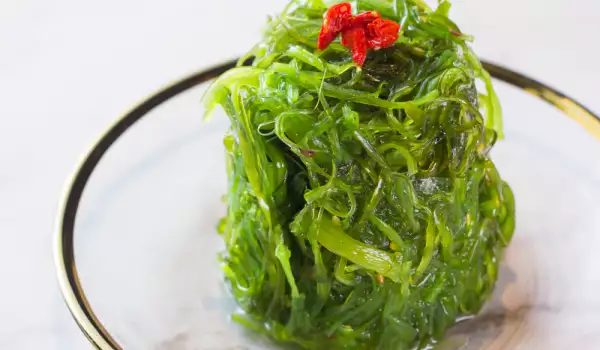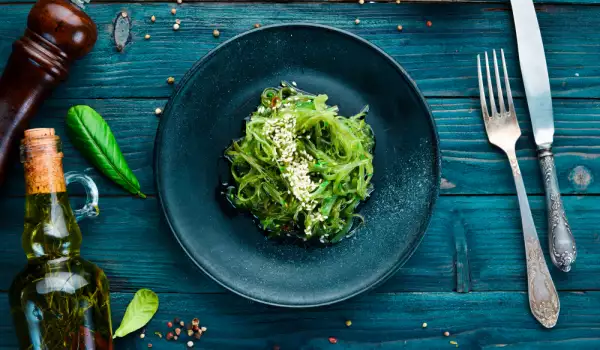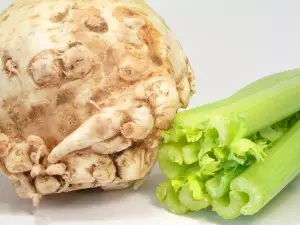The flora in the depths of the ocean gives humans not only the fabulous picture of underwater life, but also a huge amount of amazing seaweed that are used for food.
One of the edible representatives of the underwater world is the seaweed with the mysterious name Wakame. Residents of Korea and Japan were the first to get acquainted with the exotic inhabitant of the ocean floor, after which the product was widely distributed around the world.
General information about Wakame
In fact, Wakame is not just seaweed. It is considered a predator among the algae species, as it is known for its aggressive nature and ability to displace other inhabitants from the environmental zone. But its huge positive quality is that it is food, and a very healthy one at that.
In appearance, the algae is quite unremarkable. But this is only the first impression, because the treasures of the sea are hidden in it.
Wakame Culinary Profile
Wakame seaweed has a delicate salty taste. It is suitable for raw consumption or cooked. Classic Japanese miso soup is impossible without Wakame. This seaweed can be added to soup and salad, in combination with avocado cubes, tofu, cucumber, arugula leaves and crushed nuts. It goes well with soy sauce, sesame oil and rice vinegar. Dried wakame seaweed is commercially available year-round.
This seafood is one of the three most popular seaweed foods in Japanese cuisine: Wakame, Nori and Kombu.
Wakame Description
Externally, algae are plants with a dark green and sometimes brown color, with slippery leaves with a flat thread-like shape. In length, some algae can reach about two meters. They are very aggressive by nature. This helps them spread quickly and cover the entire environment, preventing the growth of other algae. Because of this ability, many consider them weeds. However, they are very popular among residents of many Asian Pacific countries.
Their salty taste, with a pleasant sweet undertone, makes them suitable for breakfast on their own, as well as as a main ingredient for the preparation of various types of soup.
Wakame is mainly sold dried in vacuum-sealed plastic packages. It only needs to be soaked for a while in cold or warm water.
Wakame Chemical Composition
Wakame is not only a healthy and nutritious food that is very beneficial for the body. It is a compact product with a rich and nutritious composition. They contain acids such as pantothenic, folic and even omega-3 fatty acids, as well as vitamins of groups K, C, A and E. Minerals are represented by: phosphorus, iron, copper, manganese and calcium.

The wealth of vegetable proteins and riboflavin is also essential. Among the unique ingredients are also alanine, aspartic acid and leucine. They are recommended to maintain the proper functioning of important systems and organs in the body. It also contains practically no calories. This means that this universal food not only replenishes nutrients in the body, but also leads to weight loss.
The main trace element that increases the value of the product is iodine. It is perfectly absorbed by the human body, enriches the thyroid gland and increases immunity, regulating the correct balance of hormones with metabolism.
Wakame seaweed may be an anti-cancer agent according to research on it. The conclusion is based on the positive effect of the substance lignin. This element is part of the plant and fights cancer cells.
It is believed that just 100 grams of seaweed guarantees the daily intake of vitamin B12 and it is a natural source of longevity and eternal youth.
Benefits of Wakame for the body
The consumption of the sea plant Wakame helps to reduce weight, lower cholesterol, strengthen the heart. They increase general tonicity, maintain hormonal balance, contribute to bone health and improve skin condition.
Wakame for weight loss
The extremely low content of calories, carbohydrates and fat in wakame seaweed is one of the reasons why the plant is essential for weight loss. The presence of fucoxanthin in the seafood is the other reason that makes it suitable for weight loss diets. Fucoxanthin prevents fat from accumulating in cells.
Wakame for heart health
In addition to preventing fat from accumulating, fucoxanthin stimulates the production of docosahexaenoic acid, a fatty acid that lowers bad cholesterol. High values of this cholesterol create conditions for the formation of plaques in the blood vessels and the development of atherosclerosis and clogging of the arteries. The consumption of the seaweed protects against various heart diseases, heart attacks and strokes.
Wakame for the health of the circulatory system
The high iron content in seaweed is a stimulus for the production of red blood cells. The element is an important component in them and high levels of red blood cells means they help blood circulate in the cardiovascular system, providing oxygen to all parts of the body. From there, it increases energy, improves the condition of the skin and accelerates the healing processes of all organs and tissues in the human body.
Iron helps for better brain activity, has a good effect on cognitive function and strengthens immunity.
Wakame for general tonicity
Wakame increases the tonicity of the body, which is due to the high magnesium content in the plant. The mineral helps the body use energy, regulates hormone levels, helps produce and use protein, which is needed for all body functions and is related to growth and recovery.
Wakame for pregnant women
The folate in Wakame, also known as vitamin B9, is useful for pregnant women, it significantly reduces the risk of birth defects in the fetus.
Wakame for bone health

In order for the bones to be healthy, it is important that the body receives enough calcium. The presence of the mineral in the product is significant, therefore the intake of this seaweed contributes to the growth of bones and accelerates their recovery. It protects against early development of osteoporosis and helps a person lead an active lifestyle for a longer time.
100 grams of Wakame contains 15% of a person's daily dose of calcium. If the amount of the mineral is insufficient, the body begins to use the bone reserves. The result is weak bones and a prerequisite for fragility, that is, osteoporosis.
Wakame for hormonal balance
The seafood is known to be rich in iodine and this is no exception. Iodine is important for maintaining hormonal balance in the body. It is indispensable in the production of thyroid hormones, on which many processes depend, including for energy in the body. The lack of the element manifests itself in the form of weight gain, chronic fatigue, hair loss and dry skin.
Harm and contraindications from Wakame
Despite its many useful properties, Wakame seaweed can also be harmful. People who are overweight and have blood pressure problems should not consume the plant because of the high levels of sodium in its composition.
Excessive use of the product can oversaturate the body with iodine. The result is nausea, diarrhea, fever and abdominal pain.
Seaweed accumulates heavy metals, but their amounts in the product are not large and with moderate use of the plant there is no health risk.











Comments